Regional films may have prevailed over the country, but regional leaders still have far mountains to climb to reach Delhi, asserts Shreekant Sambrani.
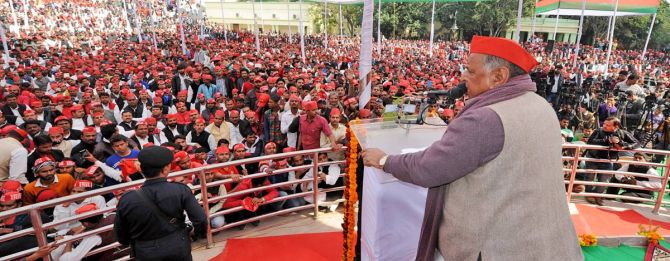
Mulayam Singh Yadav achieved many things in his eventful life, but the one position he coveted most remained out of his grasp -- the prime ministership of India.
His closeness to that kingmaker of the 1990s, Harkishen Singh Surjeet, made many (including himself) believe that he would make it in 1996, after the fall of the 13-day Atal Bihari Vajpayee government. That was close, but no cigar.
The reason for recalling this now is not just Yadav's passing (and the flood of over-the-top tributes to him, but also the possibility that more than 25 years later, many essentially regional leaders seem to be aspiring for that ultimate prize of the Indian political sweepstakes).
Like Americans, we are also in a perpetual election mood. We blithely say, 2024 is only a year-and-a-half away.
That is motivation enough for regional leaders K Chandrasekhar Rao (KCR), M K Stalin, Pinaryi Vijayan, Mamata Banerjee, among others, to eye the national political stage singly or together with allies and fronts.
Amrith Lal (The Indian Express October 7, 2022) has done well to highlight their diverse paths.
But traversing those is not likely to be at all easy for anyone of them and not just because as always, the Bhartiya Janata Party juggernaut is already on a roll.
First, there is history. In independent India, over the last three quarters of a century, only one leader with a true regional provenance has succeeded in conquering Delhi, and quite spectacularly at that. That, of course, is Prime Minister Narendra Modi.
Morarji Desai, Charan Singh, V P Singh, H D Deve Gowda and P V Narasimha Rao had all been state chief ministers before their tryst with Raisina Hill, but except for V P Singh and Rao, were all outsiders in Delhi.
The first three became prime ministers virtually under political sufferance and made early exits as national leaders.
V P Singh, the maverick politician, would have been an outsider even within his own home.
Rao was always a Delhi insider with only a tenuous and long-forgotten connection to Hyderabad.
Long-time Delhi political big wheels Y B Chavan and Sharad Pawar were always thought of as Maratha strong men.
Biju Patnaik retreated to his safe haven of Bhubaneshwar.
His son Naveen, currently the longest-serving state chief minister, is only an occasional and seemingly reluctant visitor to the national capital.
Lutyens' Delhi did not take kindly to those it considered outsiders.
There is no reason to think that its Kartavya Path avatar will behave any differently.

Second, winning a national election for either a party or an alliance is an enormous task.
It requires resources quite beyond the reach of any regional formation.
The Janata Party victory in 1977 was an aberration, the only one among our 16 general elections so far when an utterly leaderless organisation without any party structure and less financial resources won.
That was not so much to its credit as it was a nation's visceral rejection of the Emergency regime.
As of present reckoning, that constellation of forces is not likely to prevail in the next 18 months.
The 2024 election will have to be won with the usual Plan A.
That calls for the sweat of a disciplined party cadre, meticulous planning down to the voting booth level, tireless leadership on the stump 24x7.
And money, large sackfulls of it, to grease all the wheels for smooth rolling.
No prizes offered for guessing which establishment has it all.
It also has the dedicated volunteer base of the Rashtriya Swayamsevak Sangh (RSS) as an auxiliary.

All the Opposition parties are one-person/family controlled affairs.
KCR would soon learn that even having an already anointed heir, son K T Rama Rao as a stand-in, he will need to be simultaneously party head, state chief minister and a peripatetic campaigner all over the country, more than 30 times larger than his state in terms of area and population.
Things are no different for any of the other chieftains.
But Modi did it in 2014, why can't that happen again, one may well ask.
True, Modi was catapulted from the state to the hurly-burly of a national campaign.
But he was the candidate of an already large national political party.
The BJP ruled by itself or with coalition partners more than a dozen states, many of them large, with well-entrenched leadership. It had a strong cadre-based party structure and a well-oiled fund-raising machinery.
The mother ship RSS could always be counted on to provide ideological and volunteer support whenever needed.
The party in all its might was strongly behind Modi, notwithstanding the contretemps of L K Advani and some others.
So Modi had just to manage the campaign. And yet that took its toll.
He would return every single day to Gandhinagar to clear state administration work and take to the air early next morning.

By contrast, the most the present all-too willing Barkises have done by way of rousing the general public is confined mostly to their respective states.
Only Arvind Kejriwal, in reality the chief executive of a city state with limited autonomy, has made forays outside of his bailiwick and succeeded in creating another base in Punjab (an alternative narrative makes quite a plausible case that Punjab voted not so much for the Aam Aadmi Party as it did against the decades-long Congress and Akali misrule).
Others, including Mamata Banerjee have tried to test the water away from their home as in the tiny state of Goa, but even in that minor adventure they have come a cropper.
Third, the winning side needs a strong emotive appeal.
In 2014, the prevailing stench of corruption and misgovernance at all levels provided Modi the platform of acchhe din, which immediately struck a chord among the people.
Modi's Gujarat of 2010 onwards boasted of smooth roads, uninterrupted power, water supply being augmented hugely with the Narmada project progressing apace.
And masses of migrant workers from the Hindi heartland carried these tales of "foreign-like" Gujarat to their kinfolk back home.
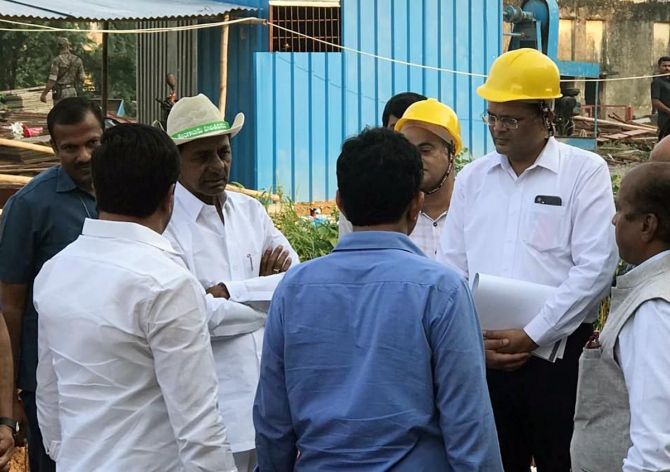
Nearly a decade later, conditions are different.
The country is not in much of a mood to listen to bad news.
The government and the media are ready to cater to the sweet tooth of the public with unmitigated good news.
Despite gnawing problems of unemployed youth and fears of rising inflation, the general mood of the country is tranquil, if not actually upbeat.
Two years after the pandemic, India wants to engage in revenge consumerism -- more goods, more celebrations, more is absolutely better and who knows, the consumer boom might even continue to propel the economy faster still!
Sorry to say, but the real message of the Bharat Jodo Yatra seems to be that dutiful grown sons should first tie their mothers' shoelaces.
More eyeballs in the evening news do not necessarily mean more votes at the hustings.
Regional films may have prevailed over the country, but regional leaders still have far mountains to climb to reach Delhi.
Feature Presentation: Aslam Hunani/Rediff.com
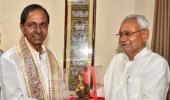








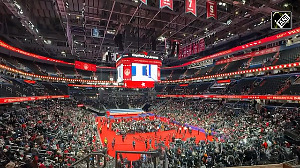
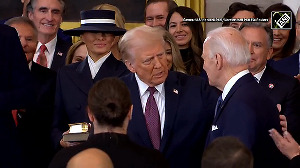
 © 2025
© 2025